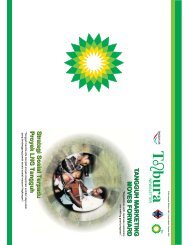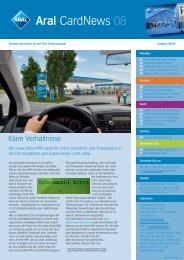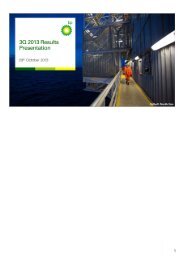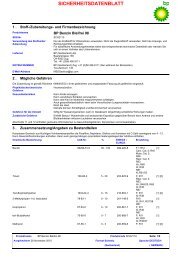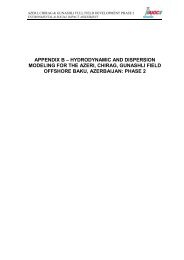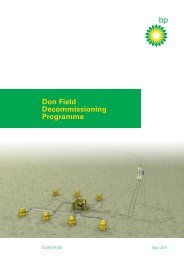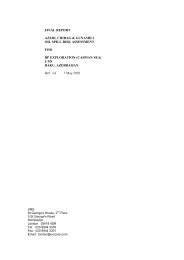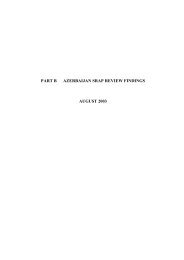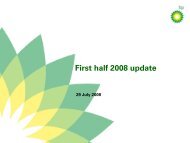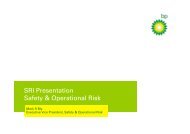BP in Angola Sustainability Report 2010 (pdf, 3860KB)
BP in Angola Sustainability Report 2010 (pdf, 3860KB)
BP in Angola Sustainability Report 2010 (pdf, 3860KB)
Create successful ePaper yourself
Turn your PDF publications into a flip-book with our unique Google optimized e-Paper software.
Build<strong>in</strong>g capability We work with a wide range of<br />
organisations <strong>in</strong> <strong>Angola</strong> with the goal of promot<strong>in</strong>g the well-be<strong>in</strong>g<br />
and development of the country<br />
Our social <strong>in</strong>vestment strategy<br />
Community <strong>in</strong>vestment aims to br<strong>in</strong>g real<br />
benefits to the country by support<strong>in</strong>g human<br />
development <strong>in</strong> the community at various<br />
levels. This is done by engag<strong>in</strong>g with<br />
stakeholders such as community and church<br />
leaders, the government, non-governmental<br />
organizations (NGOs), academics and others<br />
to f<strong>in</strong>d out how we can form partnerships that<br />
generate mutually beneficial outcomes.<br />
Across all our spend<strong>in</strong>g, and <strong>in</strong><br />
partnership with the oil <strong>in</strong>dustry as a whole <strong>in</strong><br />
<strong>Angola</strong>, we are contribut<strong>in</strong>g to projects <strong>in</strong><br />
diverse fields <strong>in</strong>clud<strong>in</strong>g support for public<br />
healthcare, donat<strong>in</strong>g medical supplies, school<br />
construction and enabl<strong>in</strong>g access to<br />
education. We try to make sure that our<br />
support complements the social welfare<br />
provision provided by the government and<br />
others <strong>in</strong>clud<strong>in</strong>g Sonangol, and re<strong>in</strong>forces<br />
efforts to tackle the UN Millennium<br />
Development Goals and other priorities.<br />
<strong>BP</strong> <strong>Angola</strong>’s susta<strong>in</strong>able development<br />
and community <strong>in</strong>vestment programme has a<br />
primary focus on education and enterprise<br />
development. Our <strong>in</strong>vestment <strong>in</strong> people is<br />
consistent across diverse <strong>in</strong>itiatives; we seek<br />
to promote education at various levels, boost<br />
the capability of local suppliers, reduce<br />
poverty and promote social <strong>in</strong>clusion and<br />
environmental conservation. This approach<br />
also <strong>in</strong>creases local participation <strong>in</strong> our<br />
bus<strong>in</strong>ess activities and aims to improve the<br />
capacity of local communities to have a larger<br />
role <strong>in</strong> the improvement of the <strong>Angola</strong><br />
economic and social environment – which are<br />
important factors for our shareholders and our<br />
cont<strong>in</strong>u<strong>in</strong>g bus<strong>in</strong>ess success. Investment <strong>in</strong><br />
skills is an underly<strong>in</strong>g theme <strong>in</strong> the<br />
programmes that we support, promot<strong>in</strong>g the<br />
well-be<strong>in</strong>g and development of the country.<br />
Jose Patricio<br />
Former <strong>BP</strong> country<br />
President, <strong>BP</strong> <strong>Angola</strong><br />
“<strong>BP</strong> is engaged <strong>in</strong> a very dynamic society<br />
here – a post-conflict environment that still<br />
faces significant social challenges. The<br />
company needs to have the capacity and<br />
the vision to make a difference. Here it is<br />
difficult to establish priorities, so it is<br />
important to understand the real<br />
aspirations of the people and to align with<br />
these trends”.<br />
<strong>BP</strong> <strong>Angola</strong>’s susta<strong>in</strong>able<br />
development and community<br />
<strong>in</strong>vestment programme has a<br />
primary focus on education and<br />
enterprise development.<br />
1<br />
2<br />
1 Pek Hak B<strong>in</strong>, <strong>BP</strong><br />
S<strong>in</strong>gapore Country<br />
President receives a gift<br />
from the community <strong>in</strong><br />
Dombe Grande,<br />
Benguela prov<strong>in</strong>ce<br />
2 Farmers at a <strong>BP</strong> funded<br />
microcredit programme<br />
Scouts at a <strong>BP</strong> funded library <strong>in</strong> Luanda<br />
Society<br />
The <strong>Angola</strong>n social context<br />
<strong>Angola</strong> achieved peace <strong>in</strong> 2002 after 27 years<br />
of armed conflict. Its socio-economic<br />
<strong>in</strong>dicators provide an <strong>in</strong>sight <strong>in</strong>to the damag<strong>in</strong>g<br />
impact of the conflict. However, from<br />
2006-10, <strong>Angola</strong> recorded high levels of<br />
economic growth (<strong>in</strong>clud<strong>in</strong>g double digit<br />
growth by the end of 2008) and has made<br />
economic reforms with some success.<br />
The Government of <strong>Angola</strong> has<br />
<strong>in</strong>creased <strong>in</strong>vestment <strong>in</strong> education, health and<br />
<strong>in</strong>frastructure. Accord<strong>in</strong>g to the UNDP, <strong>Angola</strong><br />
has made significant progress towards<br />
meet<strong>in</strong>g the Millennium Development Goals.<br />
In the eyes of the UN, atta<strong>in</strong><strong>in</strong>g them – <strong>in</strong> the<br />
light of recent trends and the country’s huge<br />
f<strong>in</strong>ancial means – is a credible challenge.<br />
However, despite the efforts made by<br />
the government and macro-economic stability,<br />
the country still suffers from visible poverty<br />
and acute social deficiencies. The Study of<br />
Population Wellbe<strong>in</strong>g, carried out by the<br />
National Institute of Statistics <strong>in</strong> <strong>2010</strong>, shows<br />
that 37% of the <strong>Angola</strong>n population still lives<br />
below the poverty l<strong>in</strong>e. The child mortality rate<br />
below five years of age is 193.5 per 1,000 live<br />
births. An estimated 41% of the population<br />
rema<strong>in</strong> under-nourished. There is scarcity of<br />
qualified human resources at bus<strong>in</strong>ess and<br />
<strong>in</strong>stitutional level, which creates a serious<br />
problem for contract<strong>in</strong>g qualified local labour.<br />
This backdrop raises fundamental<br />
questions and challenges for <strong>Angola</strong>n society<br />
as a whole. It also enables <strong>BP</strong> <strong>Angola</strong>, with<strong>in</strong><br />
the scope of its social responsibility, to help<br />
improve liv<strong>in</strong>g conditions for communities<br />
across the country.<br />
<strong>BP</strong> <strong>in</strong> <strong>Angola</strong> Susta<strong>in</strong>ability <strong>Report</strong> <strong>2010</strong> 25


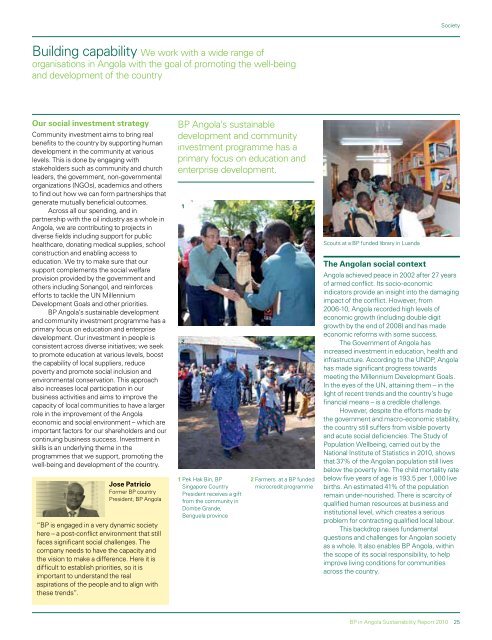
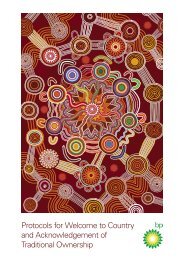
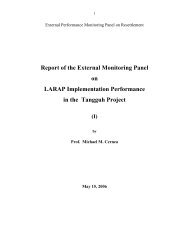
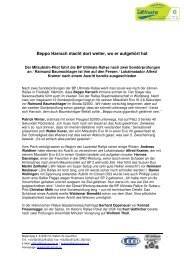
![[PDF] Deepwater Horizon: Accident Investigation Report - BP](https://img.yumpu.com/51697031/1/190x245/pdf-deepwater-horizon-accident-investigation-report-bp.jpg?quality=85)
